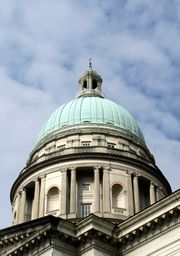President of Singapore
| President of the Republic of Singapore |
|
|---|---|
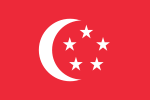 Presidential Standard |
|
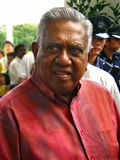 Sellapan Ramanathan since 1 September 1999 |
|
| Residence | Istana |
| Appointer | Direct popular election |
| Term length | Six years |
| Inaugural holder | Yusof bin Ishak |
| Formation | 9 August 1965 |
| Website | www.istana.gov.sg |
| Singapore |
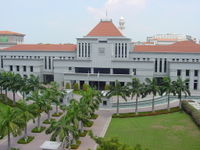 This article is part of the series: |
|
|
|
Constitution
Elections
|
|
Other countries · Atlas |
The President of the Republic of Singapore is Singapore's head of state. In a Westminster parliamentary system, which Singapore possesses, the prime minister is the head of the government while the position of president is largely ceremonial. Before 1993, the President of Singapore was chosen by Parliament. Following amendments to the constitution enacted in 1991, the Presidency became a popularly-elected office. The first President elected by the people was Ong Teng Cheong, who served from 1 September 1993 to 31 August 1999. The current President of Singapore is Sellapan Ramanathan (S.R. Nathan), who first became head of state in 18 August 1999 and is presently serving his second term of office.
The President of the Republic of Singapore is a ceremonial head of state broadly analogous to the Sovereign of the United Kingdom, but the 1991 constitutional amendments gave the President certain reserve powers over government expenditure of financial reserves and appointments to key public offices. The President's official residence is the Istana.
Contents |
History
The office of President was created in 1965 after Singapore became a republic upon its secession from the Federation of Malaysia that year. It replaced the office of Yang di-Pertuan Negara, which had been created when Singapore attained self-government in 1959. The last Yang di-Pertuan Negara, Yusof bin Ishak, became the first President. He was replaced by Benjamin Sheares after his death, who served as President until his death in 1981, when he was succeeded by Chengara Veetil Devan Nair. Owing to personal problems, Nair stepped down in 1985 and was replaced by Wee Kim Wee, who served as President until 1993.
In January 1991, the Constitution of the Republic of Singapore[1] was amended to provide for the popular election of the President. The creation of the elected presidency was a major constitutional and political change in Singapore's history as, under the revision, the President is empowered to veto the use of government reserves and appointments to key civil service appointments. He or she can also examine the administration's enforcement of the Internal Security Act[2] and Maintenance of Religious Harmony Act,[3] and look into investigations of corruption (see below).
The only popularly elected President was Ong Teng Cheong, a former cabinet minister. He served as President from 1 September 1993 to 31 August 1999. By virtue of transitional provisions in the Constitution of Singapore,[4] although Ong's predecessor Wee Kim Wee was not elected as President, because he held the office of President immediately prior to 30 November 1991 he exercised, performed and discharged all the functions, powers and duties of an elected president as if he had been elected to the office of President by the citizens of Singapore until Ong Teng Cheong took office as President.
The incumbent President is Sellapan Ramanathan, widely known as S.R. Nathan. He was not actually elected by the people in a vote, but became President by virtue of being the sole candidate deemed qualified by the Presidential Elections Committee. His first term of office was from 18 August 1999 to 31 August 2005. He was re-elected after a walkover on 17 August 2005. His current term of office will expire in 2011.
Qualifications
To be qualified to be elected President, a person must satisfy the following requirements:
- He must be a citizen of Singapore.[5]
- He must not be less than 45 years of age.[6]
- His name must appear in a current register of electors.[7]
- He must be resident in Singapore at the date of his nomination for election and must have been so resident for periods amounting in the aggregate to not less than ten years prior to that date.[8]
- He must not be subject to any of the following disqualifications:[9]
-
- (a) being and having been found or declared to be of unsound mind;
- (b) being an undischarged bankrupt;
- (c) holding an office of profit;
- (d) having been nominated for election to Parliament or the office of President or having acted as election agent to a person so nominated, failing to lodge any return of election expenses required by law within the time and in the manner so required;
- (e) having been convicted of an offence by a court of law in Singapore or Malaysia and sentenced to imprisonment for a term of not less than one year or to a fine of not less than S$2,000 and having not received a free pardon, provided that where the conviction is by a court of law in Malaysia, the person shall not be disqualified unless the offence is also one which, had it been committed in Singapore, would have been punishable by a court of law in Singapore;[10]
- (f) having voluntarily acquired the citizenship of, or exercised rights of citizenship in, a foreign country, or having made a declaration of allegiance to a foreign country;[11]
- (g) being disqualified under any law relating to offences in connection with elections to Parliament or the office of President by reason of having been convicted of such an offence or having in proceedings relating to such an election been proved guilty of an act constituting such an offence.
- He must satisfy the Presidential Elections Committee that he is a person of integrity, good character and reputation.[12]
- He must not be a member of any political party on the date of his nomination for election.[13]
- He must have for a period of not less than three years held office —
- as Minister, Chief Justice, Speaker, Attorney-General, Chairman of the Public Service Commission, Auditor-General, Accountant-General or Permanent Secretary;[14]
- as chairman or chief executive officer of the Central Provident Fund Board, the Housing and Development Board, the Jurong Town Corporation or the Monetary Authority of Singapore;[15]
- as chairman of the board of directors or chief executive officer of a company incorporated or registered under the Companies Act[16] with a paid-up capital of at least $100 million or its equivalent in foreign currency;[17] or
- in any other similar or comparable position of seniority and responsibility in any other organization or department of equivalent size or complexity in the public or private sector which, in the opinion of the Presidential Elections Committee, has given him such experience and ability in administering and managing financial affairs as to enable him to carry out effectively the functions and duties of the office of President.[18]
Disabilities
Once elected, the President shall —
- not hold any other office created or recognized by the Constitution of the Republic of Singapore;
- not actively engage in any commercial enterprise;
- not be a member of any political party; and
- if he is a member of Parliament, vacate his seat in Parliament.[19]
Term of office
The President holds office for a term of six years from the date on which he assumes office. The person elected to the office of President assumes office on the day his predecessor ceases to hold office or, if the office is vacant, on the day following his election. Upon his assumption of office, the President is required to take and subscribe in the presence of the Chief Justice or of another Justice of the Supreme Court the Oath of Office, which states:[20]
I, [name], having been elected President of the Republic of Singapore, do solemnly swear (or affirm) that I will faithfully discharge my duties as such to the best of my ability without fear or favour, affection or ill-will, and without regard to any previous affiliation with any political party, and that I will bear true faith and allegiance to the Republic, and that I will preserve, protect and defend the Constitution of the Republic of Singapore.
Maintenance: The Civil List

The Parliament of Singapore is required to provide a civil list for the maintenance of the President,[21] and it does so by way of the Civil List and Pension Act.[22] For the fiscal year 2009, the sum under Class I of the list, which includes the President's personal pay ($3,137,700, known by the British term the "privy purse"), an entertainment allowance ($69,000) and an allowance for an Acting President ($3,600), is $3,210,300.[23][24] This reduction of $822,800 from the 2008 fiscal year's approved expenditure is due to a decrease in the privy purse and a reclassification of expenses for ceremonies and celebrations hosted by the President from Class I to Class III expenses. The salaries for the President's personal staff (Class II) amount to $3,823,400, a reduction of $216,000 attributable to lower bonuses being paid in view of an expected economic slowdown. Class III expenses increased by $601,300 to $2,015,300. In addition to being used for ceremonies and celebrations, these expenses are used to cover the maintenance of the Istana, vehicles, utilities and other supplies. Class IV expenses for "special services" were increased from $89,000 to $598,400, to provide for the replacement of two state cars and the installation of a new document repository.[23]
Election
Presidential Elections Committee
The Presidential Elections Committee is established by Article 18 of the Constitution. Its function is to ensure that candidates for the office of President have the qualifications referred to in Article 19 of the Constitution.[25]
The Committee consists of:[26]
- the Chairman of the Public Service Commission, who is also the Chairman of the Presidential Elections Committee;[27]
- the Chairman of the Accounting and Corporate Regulatory Authority; and
- a member of the Presidential Council for Minority Rights nominated by the Chairman of the Council.
For the Singapore Presidential Election of 2005, the members of the Presidential Elections Committee were Dr. Andrew Chew Guan Khuan (Chairman), Lim Siong Guan and H.R. Hochstadt.[28]
Latest election
During the election of 2005, just like that of 1999, no balloting was held. As the Presidential Elections Committee determined that no other candidates satisfied the qualifications prescribed by the Constitution, S.R. Nathan was declared President unopposed.
| Candidate | Votes |
|---|---|
| S.R. Nathan | without ballot |
Powers
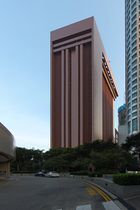
The powers of the President of Singapore are divided into those which the President may exercise in his own discretion, and those he must exercise in accordance with the advice of the Cabinet of Singapore or of a Minister acting under the general authority of the Cabinet.[29] In addition, the President is required to consult the Council of Presidential Advisers (CPA) when performing some of his functions. In other cases, he may consult the CPA if he wishes to but is not bound to do so.[30]
The Constitution confers on the President certain executive functions to block attempts by the government of the day to draw down past reserves that it did not accumulate. Thus, a guarantee may only be given or a loan raised by the Government if the President concurs,[31] and his approval is also needed for budgets of specified statutory boards and Government companies that draw on their past reserves.[32] The President also possesses personal discretion to withhold assent to any bill in Parliament providing directly or indirectly for the direct or indirect variation, changing or increase in powers of the Central Provident Fund Board to invest moneys belonging to it;[33] and the borrowing of money, the giving of any guarantee or the raising of any loan by the Government if in the President's opinion the bill is likely to draw on reserves not accumulated by the Government during its current term of office.[34] In addition, the President may withhold assent to any Supply Bill, Supplementary Supply Bill or Final Supply Bill for any financial year if in his opinion the estimates of revenue and expenditure, supplementary estimates or statement of excess are likely to lead to a drawing on past reserves.[35]
The President is also empowered to approve changes to key civil service positions, such as the Chief Justice, the Attorney-General, the chairman and members of the Public Service Commission, the Chief of Defence Force and the Commissioner of Police.[36] He also appoints as Prime Minister a Member of Parliament (MP) who, in his personal judgment, is likely to command the confidence of a majority of MPs.[37] The President has certain powers of oversight over the Corrupt Practices Investigation Bureau[38] and decisions of the Executive under the Internal Security Act[39] and the Maintenance of Religious Harmony Act.[40]
The term of office of the first elected President, Ong Teng Cheong (1993–1999), was marked by differences between him and the Government concerning the extent of his discretionary fiscal powers.[41] Discussions culminated in the Government issuing a non-binding white paper entitled The Principles for Determining and Safeguarding the Accumulated Reserves of the Government and the Fifth Schedule Statutory Boards and Government Companies (1999).[42] In 2009, the Government requested approval from President S.R. Nathan to draw S$4.9 billion from past financial reserves in order to meet current budget expenditure, the first time it had done so. The sum was used to fund the Government's Resilience Package consisting of two schemes aimed at preserving jobs and businesses during the financial downturn.[43]
List of Presidents of the Republic of Singapore
| # | Portrait | President | Start of term | End of term |
|---|---|---|---|---|
| 1 | Yusof bin Ishak[44] (12 August 1910 – 23 November 1970) |
9 August 1965 | 23 November 1970 | |
| Following the death of President Yusof bin Ishak, the Speaker of Parliament, Yeoh Ghim Seng, was installed by Parliament as acting president until the appointment of Benjamin Sheares on 2 January 1971. | ||||
| 2 | Benjamin Henry Sheares[44] (12 August 1907 – 12 May 1981) |
2 January 1971 | 12 May 1981 | |
| Once again, following the death of President Sheares, Speaker Yeoh Ghim Seng was installed by Parliament as acting president until the appointment of C.V. Devan Nair on 23 October 1981. | ||||
| 3 | C. V. (Chengara Veetil) Devan Nair[44] (5 August 1923 – 6 December 2005) |
24 October 1981 | 28 March 1985 | |
| Following the resignation of President C.V. Devan Nair, Chief Justice Wee Chong Jin was installed by Parliament as acting president until 29 March when he was replaced by Speaker of the Parliament Yeoh Ghim Seng until the appointment of Wee Kim Wee on 3 September 1985. | ||||
| 4 | Wee Kim Wee[44] (4 November 1915 – 2 May 2005) |
2 September 1985 | 1 September 1993 | |
| After the Constitution was amended in 1991, the term of President Wee was fixed to end on 1 September 1993. On that date, President Ong Teng Cheong, the first directly elected President of Singapore, assumed office. | ||||
| 5 | Ong Teng Cheong[44] (22 January 1936 – 8 February 2002) |
2 September 1993 | 1 September 1999 | |
| President Ong completed his term of office on 1 September 1999 and was succeeded by S.R. Nathan who ran unopposed on Nomination Day in 1999. | ||||
| 6 |  |
S. R. Nathan (Sellapan Ramanathan)[45] (born 3 July 1924) |
1 September 1999 | Present |
Prior to the introduction of elections for the Presidency, between 1965 and 1993, the Presidents of Singapore were Malay, Eurasian, Indian and Chinese in turn. While there might have been some general expectation that a system of rotation among the ethnic groups in Singapore would have continued to apply, this possibility was put to rest by the introduction of an elected Presidency in 1991. There are no constitutional provisions specifying that such system should apply.
All the Presidents of Singapore to date have been men. Nonetheless, in a 2008 poll of 1,256 Singaporeans conducted by MyMailMoment.com, a lifestyle research portal run by Singapore Telecommunications, 63% of women respondents and 58% of male respondents said they would vote for a female president. Those aged 50 and older were the most receptive to the idea.[46]
Notes
- ↑ Now the Constitution of the Republic of Singapore (1999 Reprint).
- ↑ Internal Security Act (Cap. 143, 1985 Rev. Ed.).
- ↑ Maintenance of Religious Harmony Act (Cap. 167A, 2001 Rev. Ed.).
- ↑ Constitution, Art. 163(1).
- ↑ Constitution, Art. 19(2)(a).
- ↑ Constitution, Art. 19(2)(b).
- ↑ Constitution, Art. 19(2)(c) read with Art. 44(2)(c).
- ↑ Constitution, Art. 19(2)(c) read with Art. 44(2)(d).
- ↑ Constitution, Art. 19(2)(d) read with Art. 45.
- ↑ The disqualification of a person under clauses (d) and (e) may be removed by the President and shall, if not so removed, cease at the end of five years beginning from the date on which the return mentioned in clause (d) was required to be lodged or, as the case may be, the date on which the person convicted as mentioned in clause (e) was released from custody or the date on which the fine mentioned in clause (1) (e) was imposed on such person: Constitution, Art. 45(2).
- ↑ A person shall not be disqualified under this clause by reason only of anything done by him before he became a citizen of Singapore: Constitution, Art. 45(2). In clause (f), "foreign country" does not include any part of the Commonwealth or the Republic of Ireland: Art. 45(3).
- ↑ Constitution, Art. 19(2)(e).
- ↑ Constitution, Art. 19(2)(f).
- ↑ Constitution, Art. 19(2)(g)(i).
- ↑ Constitution, Art. 19(2)(g)(ii) read with Art. 22A(3) and Pt. I of the Fifth Schedule.
- ↑ Cap. 50, 2006 Rev. Ed. (S'pore).
- ↑ Constitution, Art. 19(2)(g)(iii).
- ↑ Constitution, Art. 19(2)(g)(iv).
- ↑ Constitution, Arts. 19(3)(a)–(d).
- ↑ Constitution, Arts. 20(1)–(3) and the 1st Sch.
- ↑ Constitution, Art. 22J(1).
- ↑ Civil List and Pension Act (Cap. 44, 2002 Rev. Ed.).
- ↑ 23.0 23.1 "Funds approved for Office of the President", The Straits Times: C6, 23 January 2009.
- ↑ Civil List and Pension Act: Notice of Resolution of Parliament (S 139/2009, 22 January 2009).
- ↑ Constitution, Art. 18(1).
- ↑ Constitution, Arts. 18(2)(a)–(c).
- ↑ Constitution, Art. 18(3).
- ↑ "Presidential Elections Committee [No. 1342 of 2005]" (PDF), Government Gazette, 27 May 2007, archived from the original on 26 June 2008, http://web.archive.org/web/20080626162841/http://www.elections.gov.sg/gazette/20050527b.pdf.
- ↑ Constitution, Arts. 21(1) and (2).
- ↑ Constitution, Arts. 22(3) and (4). The Legislature can pass a law requiring the President to act after consultation with, or on the recommendation of, any person or body of persons other than the Cabinet in the exercise of his functions other than those exercisable in his personal discretion or in respect of the Constitution has made other provision: Art. 21(5).
- ↑ Constitution, Art. 144(1).
- ↑ Constitution, Arts. 21(2)(e), 21(2)(f), 22B and 22D.
- ↑ Constitution, Art. 22E.
- ↑ Constitution, Art. 144(2).
- ↑ Constitution, Arts. 148A and 148D.
- ↑ Constitution, Art. 22(1).
- ↑ Constitution, Art. 25(1).
- ↑ Constitution, Art. 22G. The Corrupt Practices Investigation Bureau's powers of investigation derive from the Prevention of Corruption Act (Cap. 241, 1993 Rev. Ed.).
- ↑ Constitution, Arts. 21(2)(g) and 151(4); Internal Security Act (Cap. 143, 1985 Rev. Ed.), s. 13A.
- ↑ Constitution, Arts. 21(2)(h), 22I; Maintenance of Religious Harmony Act (Cap. 167A, 2001 Rev. Ed.), s. 12.
- ↑ Hu, Richard Tsu Tau (Minister for Finance), Ministerial Statement, "Issues Raised by President Ong Teng Cheong at his Press Conference on 16th July 1999", Singapore Parliamentary Debates, Official Report (17 August 1999), vol. 70, cols. 2018–2029; Roger Mitton (10 March 2000), "'I had a job to do' whether the Government liked it or not, says ex-President Ong – extended interview with Roger Mitton", Asiaweek 26 (9): 28–29, archived from the original on 10 February 2001, http://web.archive.org/web/20010210092142/http://www.asiaweek.com/asiaweek/magazine/2000/0310/nat.singapore.ongiv.html.
- ↑ The Principles for Determining and Safeguarding the Accumulated Reserves of the Government and the Fifth Schedule Statutory Boards and Government Companies [Cmd. 5 of 1999], Singapore: Printed for the Government of Singapore by the Government Printers, 1999, OCLC 226180358.
- ↑ Zakir Hussain (23 January 2009), "A Budget first: Govt to draw $4.9b from past reserves", The Straits Times; "Concerns about economy go back to mid-2008: President makes public for first time his decision to allow use of reserves", The Straits Times, 18 February 2009; Chua Mui Hoong (20 February 2009), "Turning of the second key went smoothly", The Straits Times.
- ↑ 44.0 44.1 44.2 44.3 44.4 Former Presidents, Istana Singapore: Office of the President of the Republic of Singapore, 28 April 2006, archived from the original on 1 August 2008, http://web.archive.org/web/20080801172419/http://www.istana.gov.sg/FormerPresidents/index.htm, retrieved 24 January 2009.
- ↑ President S R Nathan, Istana Singapore: Office of the President of the Republic of Singapore, 4 May 2006, archived from the original on 22 August 2008, http://web.archive.org/web/20080822063958/http://www.istana.gov.sg/PresidentSRNathan/index.htm, retrieved 24 January 2009.
- ↑ Ansley Ng (6 August 2008), "Madam President? Yes, says 1 in 2" (PDF), Today (reproduced on the National University of Singapore website), archived from the original on 24 January 2009, http://www.webcitation.org/5e3DyQFjb, retrieved 24 January 2009.
References
- Constitution of the Republic of Singapore (1999 Reprint).
Further reading
Articles
- Wan, Wai Yee (1994), "Recent Changes to the Westminster System of Government and Government Accountability", Singapore Law Review 15: 297–332.
- Lee, Yvonne C.L. (2007), "Under Lock and Key: The Evolving Role of the Elected President as a Fiscal Guardian", Singapore Journal of Legal Studies: 290–322, http://ssrn.com/abstract=1139305.
Books
- Chan, Helena H[ui-]M[eng] (1995), "The Executive", The Legal System of Singapore, Singapore: Butterworths Asia, pp. 22–29, ISBN 978-0-409-99789-7 (pbk.).
- Ho, Khai Leong (2003), Shared Responsibilities, Unshared Power: The Politics of Policy-making in Singapore, Singapore: Eastern Universities Press, ISBN 978-9-812-10218-8.
- Low, Linda; Toh, Mun Heng (1989), The Elected Presidency as a Safeguard for Official Reserves: What is at Stake? [IPS occasional paper; no. 1], Singapore: Times Academic Press in association with the Institute of Policy Studies, ISBN 978-9-810-01014-0.
- Report of the Select Committee on the Constitution of the Republic of Singapore (Amendment No. 3) Bill (Bill No. 23/90) [Parl. 9 of 1990], Singapore: Printed for the Government of Singapore by Singapore National Printers, 1990, OCLC 212400288.
- Safeguarding Financial Assets and the Integrity of the Public Services: The Constitution of the Republic of Singapore (Amendment No. 3) Bill [Cmd. 11 of 1990], Singapore: Printed for the Government of Singapore by Singapore National Printers, 1990, OCLC 39716236.
- Tan, Kevin [Yew Lee]; Lam, Peng Er (1997), Managing Political Change in Singapore: The Elected Presidency, Singapore: Routledge, ISBN 978-0-415-15632-5.
- Tan, Kevin Y[ew] L[ee] (2009), "State and Institution Building through the Singapore Constitution 1965–2005", in Thio, Li-ann; Tan, Kevin Y[ew] L[ee], eds., Evolution of a Revolution: Forty Years of the Singapore Constitution, London; New York, N.Y.: Routledge-Cavendish, pp. 50–78 at 68–71, ISBN 978-0-415-43862-9 (hbk.), ISBN 978-0-203-88578-9 (ebk.).
External links
|
||||||||||||||
|
||||||||||||||
|
|||||||||||||||||||||||
